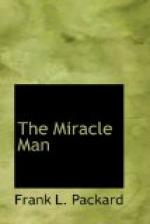“Coogan!”—Mr. Higgins’ face paled, and he took a firmer grip on his whiskers. “Now if you ain’t gone an’ put your fool foot in it, Hiram Higgins,” he said miserably. “If that there’s the fellow that you writ to, you’ve just laid out to make a plumb fool of the Patriarch, ’cause I reckon the Almighty knew His own mind when He made a critter like that, an’ didn’t calc’late to have His work upsot much this side of the grave—not even by the Patriarch.”
—IX—
THE PILGRIMAGE
Faith is an inheritance common to the human race; and the human race in its daily life, in its daily dealings, man to man, could not go on without it—but faith is a matter of degree. Faith, in the abstract, the element of it, is inborn in every soul; and while dormant, until put to a crucial test along any given line, is boundless and unlimited—a sort of tacitly accepted, existing state, unquestioned. Faith in many is a sturdy, virile thing—to a certain point. It is the fire that proves.
Needley had faith in the Patriarch—a faith that never before had been questioned. But Needley had more than that—Needley held the Patriarch in affection, as a cherished thing, almost sacredly, almost as an idol. Faith the simple people of Needley had always had—to a certain point—but it faltered before this grotesque, inhuman, twisted shape that squatted in the road before the Congress Hotel like a hideous caricature of an abnormal toad. Their faith failed to bridge the span that gave the Patriarch power over such as this, and they saw their idol shattered in their own eyes, and held up to mockery before the eyes of these strangers who had so suddenly and tempestuously swarmed upon them.
Hiram Higgins, seeking out Doc Madison inside the hotel, was in a state bordering on distraction.
“I druve him over from the station ‘cause he couldn’t walk, him an’ a man, an’ two women, an’ a wheel-chair,” Mr. Higgins explained. “But what’s to be done now? He wants me to drive him out to the Patriarch’s. I got faith in the Patriarch, but I never said he could work miracles—there ain’t no one on earth could straighten that critter out. Don’t stand to reason that the Patriarch’s to be made a fool of.”
“Certainly not,” agreed Madison emphatically. “It’s most unfortunate. I suppose all of us here in Needley”—he looked around at the assembled group of leading citizens—“feel the same way, too?”
“Of course we do,” said Mr. Higgins helplessly. “Couldn’t feel no ways else.”
Madison laid his hand suddenly, impressively, upon Mr. Higgins’ shoulder and looked meaningly into Mr. Higgins’ eyes—and into the eyes of the selectmen, the overseers of the poor, the general-store proprietor, and the school committee.
“Don’t drive him over, then,” he said significantly. “Don’t any of the rest of you do it either—and tell everybody else not to. Make him crawl. If he’s determined to go, let him get there by himself if he can, make him crawl—he’ll never be able to do it.”




